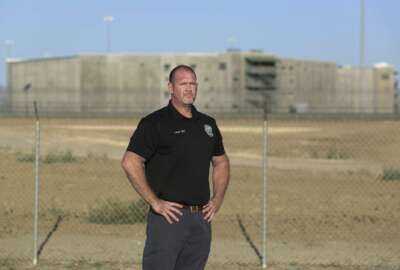New 25% retention bonuses at Bureau of Prisons only a ‘Band-Aid’ for larger staffing issues
The American Federation of Government Employees said OPM’s approval of retention bonuses for correctional officers is a positive step, but the union remains...
Correctional officers at the Federal Bureau of Prisons (BOP) are hoping the recent approval of retention bonuses will offer at least a little relief to a workforce that’s been struggling for years.
The Office of Personnel Management approved pay bonuses on Sept. 21 for correctional officers working in several BOP facilities nationwide. The retention incentive amounts to 25% of an employee’s base salary.
Although Council 33 of the American Federation of Government Employees (AFGE), which represents over 30,000 BOP officers and other staff members, readily welcomed OPM’s approval of the one-time bonuses, union leaders remain wary.
AFGE Council 33 National President Brandy Moore White said the pay incentives won’t be enough to stave off massive, ongoing staffing challenges across the entire agency.
“I will be brutally honest, I think they’re Band-Aids,” White said in an interview with Federal News Network.
BOP, an agency within the Department of Justice, has more than 34,000 correctional officers and staff who face near-countless workforce challenges, including significant and persistent understaffing.
White said the issues at BOP over the last several years have created “a perfect storm.”
“Since 2016, we’ve faced severe staff cuts … a decline in the public’s perception of law enforcement and then COVID,” she said. “We are probably one of the lowest-paid federal law enforcement groups.”
As a result, already difficult challenges with BOP staffing have massively worsened. In the last seven years, BOP staffing levels have dropped more than 20%, bottoming out at a current 40% shortage of correctional officers, according to AFGE.
Correctional officers now face a growing use of overtime, workforce fatigue and burnout, and threats to safety and security for both staff and inmates. AFGE has called out the agency over a high number of incidents involving sexual misconduct against BOP staff members.
BOP also came under fire earlier this year after a former warden at the Federal Correctional Institution in Dublin, California, was charged with multiple counts of sexual abuse and sexual contact.
Still, the new retention incentives that OPM approved to try to alleviate attrition may be an early sign of a turning tide for the agency.
OPM has the authority to approve larger pay incentives in instances where agencies can show that employees are likely to leave their positions, either for another federal position, or to leave the government’s workforce altogether.
The 25% retention bonuses have been approved for officers working in the following eight facilities:
- Federal Correctional Institution in Dublin, California
- Federal Correctional Institute in Herlong, California
- Metropolitan Correctional Center in San Diego, California
- Metropolitan Detention Center in Los Angeles, California
- United States Penitentiary in Atwater, California
- Federal Correctional Complex in Florence, Colorado
- Federal Correctional Institution in Sheridan, Oregon
- Federal Detention Center in SeaTac, Washington
John Butkovich, president of AFGE Local 1169, representing employees in the correctional complex in Florence, Colorado, said the pay incentives are much-needed — the location is one of the most understaffed prisons in the country.
“We desperately need additional support to recruit and retain sufficient staff,” Butkovich said in a press statement Tuesday.
But it’s now up to BOP to determine who will receive the incentives, and when. In general, agencies can issue retention incentive payments either in installments or as a single lump-sum payment. With the new approval, BOP may now authorize a group retention incentive of up 25% for the covered BOP employees, OPM said.
OPM is currently reviewing additional requests to authorize the bonuses at other correctional facilities, AFGE said.
“While we absolutely support anything that is positive, because it is very beneficial to our members in the field, we absolutely need more help,” White said.
A lot of work remains ahead to address the recruitment and retention crisis. Earlier this year, BOP took the last place spot in the Partnership for Public Service’s Best Place to Work rankings.
The bureau’s overall employee engagement and satisfaction score nosedived from 55.1 to 35.5 out of 100 in just the last two years, the Partnership’s results showed.
In particular, the agency’s score from the Partnership took a major hit after the start of the COVID-19 pandemic. Amid a shortage of personal protective equipment, correctional officers, other prison staff and inmates were all put at higher risk in their close proximity.
The workforce struggles have gained the attention of the Government Accountability Office as well. Earlier this year, GAO added “strengthening management of the federal prison system” to its 2023 High Risk List.
“We added the federal prison system partly due to BOP’s longstanding challenges with managing staff and resources, and planning and evaluating programs that help incarcerated people successfully return to the community,” GAO said.
Leaders at BOP are taking steps to try to address the challenges. In April, BOP launched a new hiring initiative, which included offering, for the first time ever, recruitment bonuses for new employees. Correctional officers who joined BOP between April and September this year are eligible for a bonus equal to the greater amount between either $10,000 or 25% of their initial base salary.
And in February, BOP said more people were hired than left the bureau through attrition.
“This is positive momentum towards increased staffing levels,” BOP said in an April 5 press release.
But White said she is now highly concerned about the impacts of a possible government shutdown this November.
Although Congress successfully passed a 45-day continuing resolution, the House and Senate are no closer to reaching an agreement on spending levels for the government in fiscal 2024. The tension on Capitol Hill has kept many federal employees wary of what’s to come in November.
In the case that there is a government shutdown, BOP officers are considered excepted employees, meaning they would continue to work throughout a shutdown without getting paid.
All federal employees are eventually guaranteed backpay, thanks to a 2019 law, but White said the time that BOP officers would have to go without a paycheck would certainly be difficult.
“It’s just hard,” White said. “20 years ago, people were begging to come to the government — it was a great job with great pay and it provided security for a lot of people. People looking to come to the bureau don’t see that now. They see that we have not been paid several times … that makes the recruitment and retention even harder. Another government shutdown will just exacerbate that.”
Copyright © 2025 Federal News Network. All rights reserved. This website is not intended for users located within the European Economic Area.
Drew Friedman is a workforce, pay and benefits reporter for Federal News Network.
Follow @dfriedmanWFED






